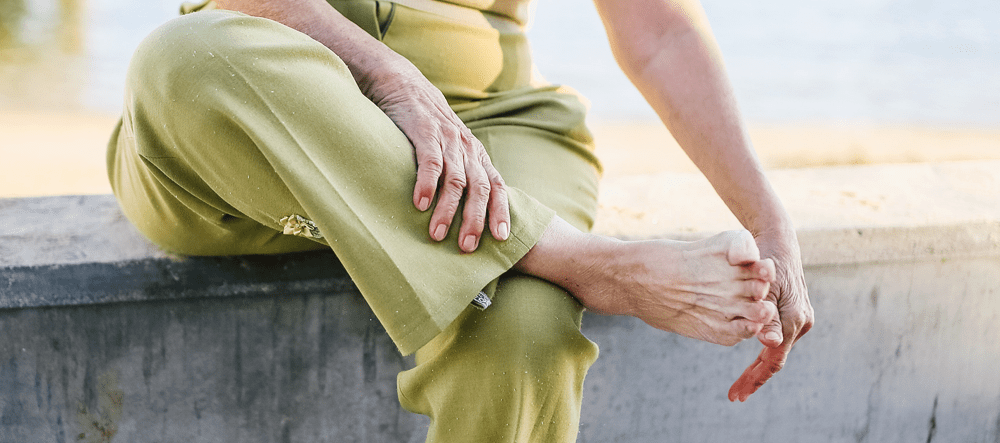Aging Feet Need Extra Care: Tips for Caregivers

Feet are often one of the most neglected and unappreciated parts of our body, but caring for them is so important for staying healthy, active and independent as we age. Foot issues are common in older adults as feet lose cushioning over time, nails and skin can grow brittle and dry and many seniors experience reduced circulation. Other health conditions like heart disease and diabetes can affect blood flow and nerve function in the lower extremities and minor foot concerns can create major problems.
If someone you are caring for has mobility challenges, reduced eyesight or a chronic disease that can impact their foot health, they may need some extra support to take proper care of their feet. Here’s some information for you on preventative foot care for caregivers:
Regularly Monitor
It is common for seniors to experience foot issues or pain without letting anyone know. They may not want to burden others with this type of care or they may assume it’s a regular part of aging. In some cases they may not be able to feel their feet and don’t recognize that there’s a problem. Make foot care a regular part of your daily caregiving routine by thoroughly inspecting the person’s feet—both by looking at them and feeling their feet with your hands. Watch for cuts, bedsores, calluses, cracks, ingrown toenails, bumps or pressure points where sores and ulcers may form and talk to a health professional if you notice any concerning changes. This is particularly important if your loved one has diabetes as injuries can take a long time to heal and may become infected.
Keep Feet Clean and Moisturized
Even if the person you are caring for can shower or bathe on their own, they may not be able to reach their feet to clean them properly. Wash their feet every day with warm water and soap and dry thoroughly to prevent fungal infections—taking extra care between the toes. Or if a professional caregiver is involved with your loved one’s care, ask them to pay attention to the foot area. After washing and drying, apply a foot lotion to prevent the skin from cracking. Cover your loved one’s feet with breathable, cotton socks to lock in moisture and for comfort and warmth. Making this a part of the bedtime routine is a great way to promote relaxation and connection with the person you are caring for.
Trim Nails Often and Correctly
Long toenails can cause pain, interfere with walking and become ingrown, but many seniors can’t reach their own toenails to trim them. Always keep your loved one’s toenails trimmed or find a podiatrist, nail care clinic or home care service that specializes in senior foot care. If you are doing the clipping yourself, be careful not to cut nails too short and trim them straight across and file them to round out the edges. Wash your hands before and after caring for your loved one’s feet and disinfect clippers between uses. Dementia or other cognitive challenges can make toenail trimming distressing for some older adults. Try to make the process more relaxing by soaking and massaging their feet or putting on a favourite television show as a distraction.
Find Proper Footwear
Wearing shoes that are too big or too small can cause painful blisters, circulation problems, bunions, corns or ingrown toenails. Find a professional to fit your loved one for shoes with solid support, a closed toe, good grips and sturdy closing methods—untied laces can be a tripping hazard. Most quality shoe retailers should be able to assist you with this. If possible, also invest in a pair of indoor shoes to reduce fall risks and to prevent cuts, scrapes or burns around the house. This is particularly important if your loved one has circulation issues that can cause undetected injuries. If the person you are caring for is immobile, in a wheelchair or bedridden, padded socks that don’t restrict their feet will help protect the heel area from pressure ulcers.
Focus on Circulation
Many seniors have poor circulation in their feet and depending on their mobility, encouraging your loved one to get regular exercise can be helpful. Check in with a doctor for specific recommendations, but walking, swimming, yoga, or an online seated exercise class are all great activities that support foot health. Remind your loved one to elevate their feet when sitting down, not to cross their legs and offer a foot massage to get the blood flowing down to their toes. If the person you are caring for often has cold feet, avoid heating pads or hot water bottles that can cause burns in seniors with circulation difficulties. Instead, make sure that socks, sturdy indoor shoes and blankets are available for warmth.
Get Help
Discoloured toenails, calluses, bunions, tingling, numbness or any pain or swelling should be checked out by a medical professional. There are products like orthotics, toe separators, bunion pads and prescription or over-the-counter medications that can prevent many of these issues. Podiatrists are often covered by extended health benefit plans and there are free senior foot care clinics offered in the community.
If you would like assistance caring for your loved one’s feet, an expert at VHA Home HealthCare with the right skills, training and equipment may be able to help. Call VHA’s Enterprise Health Solutions team at 1-888-314-6622 ext. 4649 or ehs@vha.ca to find out more about our Foot Care Services available for purchase.
